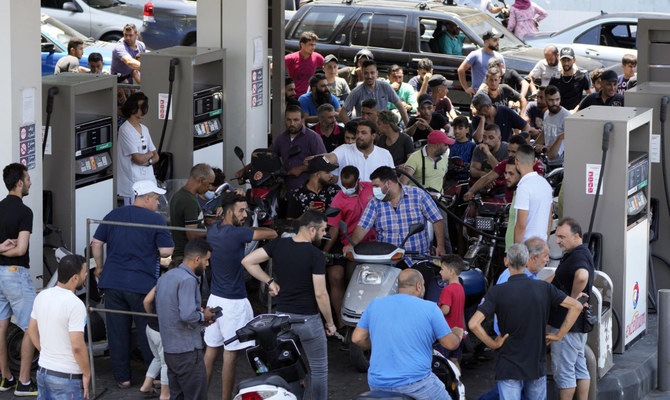
Representative of fuel distributors in Lebanon, Fadi Abou Chakra, told Arab News that “fuel is currently available, but we hope that officials will respond to the owners of importing companies to avoid crises and long queues”
BEIRUT: Long queues at gas stations returned to Lebanon after fuel-importing companies announced a “forced cessation of importing and delivering petroleum products, starting Wednesday morning.”
They are protesting against a provision in the 2024 state budget that imposes a 10 percent exceptional tax on “institutions and merchants, including fuel-importing companies, who benefited from subsidies exceeding $10,000 provided by the Central Bank.”
The Syndicate of Pharmaceutical Importers and Warehouse Owners in Lebanon joined the protest, considering the tax “a random project that is not based on any economic or legal basis. Its adoption will inevitably lead to a blow to the entire legitimate pharmaceutical sector, endanger the citizens’ health security, and threaten the availability of medicine in Lebanon.”
The protests were accompanied by a strike that will last until Feb. 9, initiated by public-sector employees “to protest their mediocre salaries and piecemeal policies.” Judicial assistants will be joining them on Thursday, disrupting the operations of the courts.
Private hospitals feared that halting fuel deliveries would affect the continuity of their work, “given their need for diesel for their electric generators.” They urged “fuel-importing companies to exempt hospitals from their decision and provide them with their needs immediately in order to preserve the lives of patients.”
Last Friday, the Lebanese Parliament approved the draft budget for 2024, which was prepared by the government after being amended by the parliamentary finance and budget committee.
The budget was labeled “a tax bonanza.” During the discussion session prior to its approval, MPs said that it “lacks both economic and social visions and was submitted without proper accountability.”
Following the parliamentary amendments, the budget included taxes that have risen tenfold, including municipal fees, registration fees, travel fees, taxes on environmentally friendly cars, taxes on bank accounts, fines on marine property owners, and raising the tax on the profits of financial companies. It included exceptional fines of 17 percent for institutions that have benefited from the “Sayrafa” platform, in addition to the exceptional tax reaching 10 percent of business volume that was imposed on merchants who benefited from the subsidies provided by the Central Bank, including fuel-importing companies.
Representative of fuel distributors in Lebanon, Fadi Abou Chakra, told Arab News that “fuel is currently available, but we hope that officials will respond to the owners of importing companies to avoid crises and long queues.”
Maroun Chammas, president of the Association of Petroleum Importing Companies, blamed the executive and legislative authorities for the current crisis. He said: “It is the Lebanese citizens, not the companies, who have benefited from the support. We have requested clarifications from the relevant authorities, but we have not received a satisfactory response yet.”
During a press conference on Wednesday afternoon, Chammas said: “The decision to close is not easy, and this is the last resort for us, although it is not appealing.” He said “the tax that was approved cannot be implemented as companies that comply with the laws should not be punished.”
On the resumption date for fuel delivery, Chammas said: “The answer lies in the Parliament.”
The Public Administration Employees Association, which called for the strike, considered the 2024 budget to be a “tax and fee budget imposed on a people who have been robbed of everything they own in banks, and now they are implementing an unfair haircut on the employees’ salaries and all their entitlements, including health coverage, educational benefits, and social benefits. Despite all of this, the government continues to ignore the rights of all low-income individuals in the public sector, and the maximum violence is manifested in the face of general administration employees and all those who work in it.”
The government had previously reached a common formula with workers of the Public Administration Employees Association at the end of last year for a financial incentives package. This package was intended to compensate employees for a portion of their lost salaries and ensure their return to their duties after a months-long open strike. However, the proposed financial incentives were suspended after significant objections from sectors not included in the increase decision, and the crisis returned to its previous state.
The 2024 budget did not include any financial incentives for public-sector employees, nor any privileges or benefits for workers.
During the budget approval session, the caretaker prime minister, Najib Mikati, told the Parliament that the budget “aligns with the economic, security, social and international conditions that Lebanon is currently facing, but it is not perfect.”
He said that “the major attack on taxes and fees stipulated in the budget project is filled with populism and bias, as there is no significant increase in taxes, and adjusting fees does not constitute the burden that some MPs talked about.”











